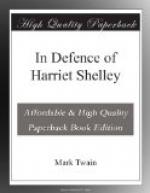“Dearest
when most thy tender traits express
The
image of thy mother’s loveliness.”
Up to this point the fabulist counsel for Shelley and prosecutor of his young wife has had easy sailing, but now his trouble begins, for Shelley is getting ready to make some unpleasant history for himself, and it will be necessary to put the blame of it on the wife.
Shelley had made the acquaintance of a charming gray-haired, young-hearted Mrs. Boinville, whose face “retained a certain youthful beauty”; she lived at Bracknell, and had a young daughter named Cornelia Turner, who was equipped with many fascinations. Apparently these people were sufficiently sentimental. Hogg says of Mrs. Boinville:
“The greater part of her associates were odious. I generally found there two or three sentimental young butchers, an eminently philosophical tinker, and several very unsophisticated medical practitioners or medical students, all of low origin and vulgar and offensive manners. They sighed, turned up their eyes, retailed philosophy, such as it was,” etc.
Shelley moved to Bracknell, July 27th (this is still 1813) purposely to be near this unwholesome prairie-dogs’ nest. The fabulist says: “It was the entrance into a world more amiable and exquisite than he had yet known.”
“In this acquaintance the attraction was mutual”—and presently it grew to be very mutual indeed, between Shelley and Cornelia Turner, when they got to studying the Italian poets together. Shelley, “responding like a tremulous instrument to every breath of passion or of sentiment,” had his chance here. It took only four days for Cornelia’s attractions to begin to dim Harriet’s. Shelley arrived on the 27th of July; on the 31st he wrote a sonnet to Harriet in which “one detects already the little rift in the lover’s lute which had seemed to be healed or never to have gaped at all when the later and happier sonnet to Ianthe was written”—in September, we remember:
Exhibit D
“Evening. To Harriet
“O
thou bright Sun! Beneath the dark blue line
Of
western distance that sublime descendest,
And,
gleaming lovelier as thy beams decline,
Thy
million hues to every vapor lendest,
And
over cobweb, lawn, and grove, and stream
Sheddest
the liquid magic of thy light,
Till
calm Earth, with the parting splendor bright,
Shows
like the vision of a beauteous dream;
What
gazer now with astronomic eye
Could
coldly count the spots within thy sphere?
Such
were thy lover, Harriet, could he fly
The
thoughts of all that makes his passion dear,
And
turning senseless from thy warm caress
Pick
flaws in our close-woven happiness.”




